- L'enseignant est convaincu que sa tâche principale est d’évaluer l’impact de son enseignement sur l’apprentissage et le progrès des élèves.
- L'enseignant est convaincu qu'il est l'agent du changement, donc que la réussite ou l’échec dans l’apprentissage de l’élève dépendent de lui.
- L'enseignant est convaincu qu'il faut discuter davantage de l’apprentissage que de l’enseignement.
- L'enseignants perçoit l’évaluation comme un outil de mesure de son impact sur les élèves.
- L'enseignant favorise le dialogue par rapport au monologue.
- L'enseignant aime relever les défis et veut toujours faire de son mieux.
- L'enseignant est convaincu que créer des relations positives avec les élèves et ses collègues fait partie de son rôle.
- L'enseignant montre à tous le langage de l’apprentissage. (ceci mérite une explication- en-dessous du vidéo!)
Ces 8 états d'esprit sont bien représentés dans ce court vidéo
http://www.youtube.com/watch?v=5WSTcVDwH3s
petite anecdote : initialement il y en avait 7 principes, mais Hattie en a rajouté un la 8e au fur et à mesure des présentations et des publications
Nous avons aussi appris que ces parents ne comprenaient pas ce qui se passe dans une école – et c’est d’ailleurs encore le cas pour beaucoup de parents aujourd’hui. Ils ne comprennent pas le langage de l’apprentissage ni ce qu’apprendre veut dire aujourd’hui. Ils ne savent donc pas en parler avec leurs enfants et ne savent pas non plus discuter avec les enseignants de ce que leurs enfants apprennent....
Dans un projet, des enseignants à la retraite ont éclairé les parents sur le langage scolaire. Les parents ont ainsi appris la nature de l’apprentissage dans les classes, ils ont appris à aider leurs enfants à être assidus et à participer à leur apprentissage et ils ont découvert comment parler avec les enseignants et le personnel scolaire. Enseigner le langage de l’apprentissage aux parents a permis d’améliorer l’engagement des élèves dans leur expérience à l’école, d’accroître leur rendement en lecture, d’améliorer les compétences et l’emploi des parents et d’accroître leurs attentes, leur satisfaction et leur appui envers les écoles et la communauté locales.
En 2015, la Fédération Wallonie-Bruxelles a fait procéder à une analyse dont l’objectif de est de contribuer au diagnostic du système scolaire en FWB, en particulier: « les éléments relatifs à la performance des élèves et aux problèmes d’équité, l’existence et l’évaluation des pratiques au sein du système, et les éléments relatifs au management des établissements scolaires ».
En 2015, le Luxembourg a publié pour la première fois le "Bildungsbericht Luxemburg", un rapport descriptif de la qualité du système éducatif luxembourgeois. Sous la coordination du SCRIPT, le rapport est élaboré tous les cinq ans par un groupe d’experts désigné par le ministre. Cet état des lieux régulier est censé servir de base objective aux débats sur l’école et aux décisions de politique scolaire.
Une lecture comparée des deux rapports constate des nombreuses similitudes, mais des pistes et des démarches de rémédiations parfois divergentes.
Today the European Commission published the results of the 2016 edition of the Digital Economy and Society Index (DESI). The findings show that Member States have made progress in areas such as connectivity and digital skills, as well as in public services, since the publication of the Commission's Digital Single Market Strategy last year.
While highlighting improvements, the results released today also show that the pace of progress is slowing down. This movement affects also Luxembourg and we'll try to have a closer look at the DESI-date.
The indicators are organized in 5 sets which are organized in sub-dimensions
Connectivity |
|
Human Capital |
|
Use of Internet |
|
Integration of Digital Technology |
|
Digital Public Services |
|
This is how the performance of Luxembourg looks compared to the EU-average and compared to similar-performing countries which are countries that are performing well, but that are not progressing anymore.
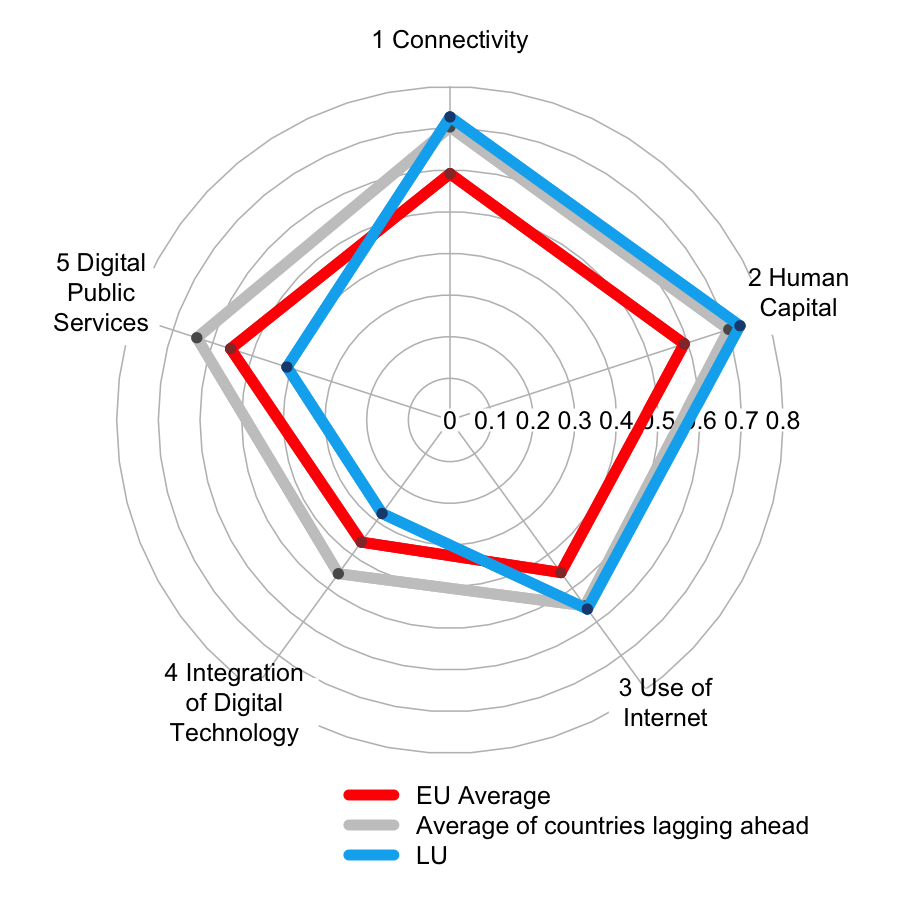
Connectivity
Connectivity along with Human Capital and Use of Internet are the DESI 2016 dimensions where Luxembourg performs best. With an overall Connectivity score of 0.73 the country ranks high among EU countries.
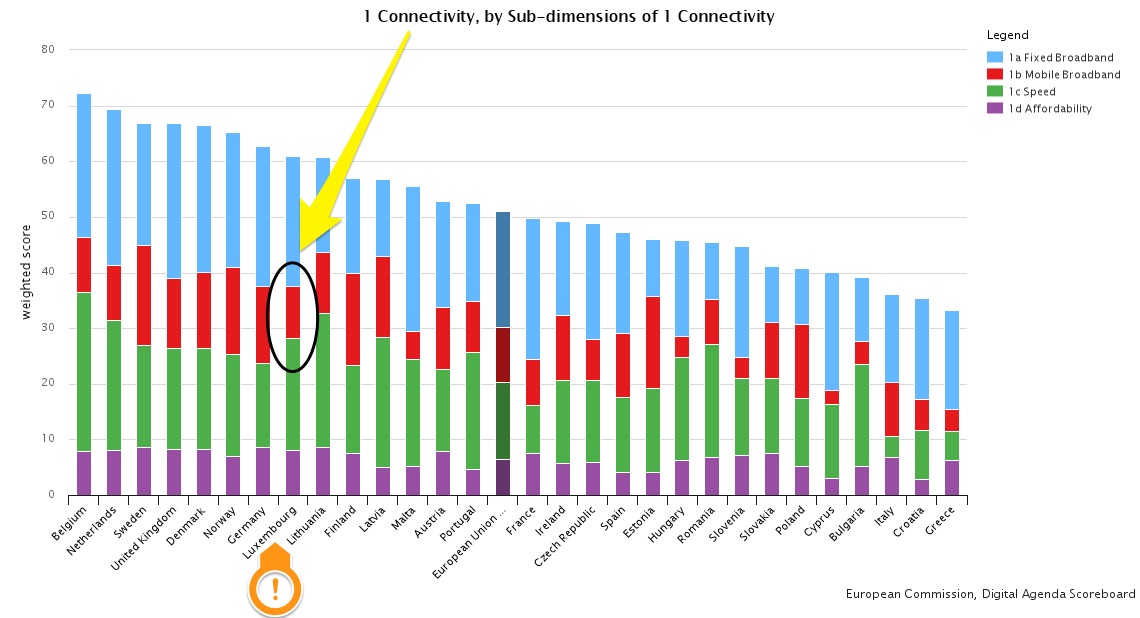
However, by analyzing the details of this indicator, you can see that Luxembourg still lacks behind in terms of Mobile Broadband access and that the situation is like coming to stand-still.
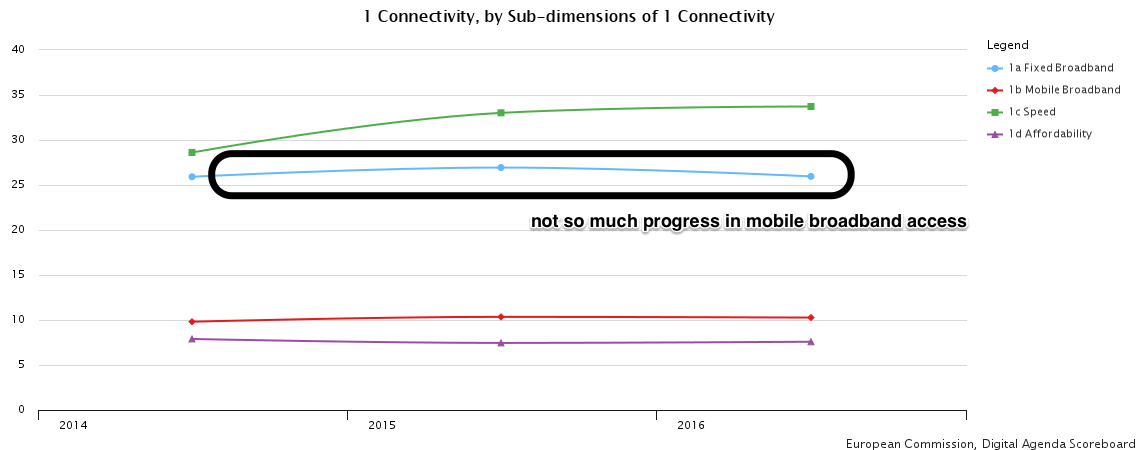
Human Capital
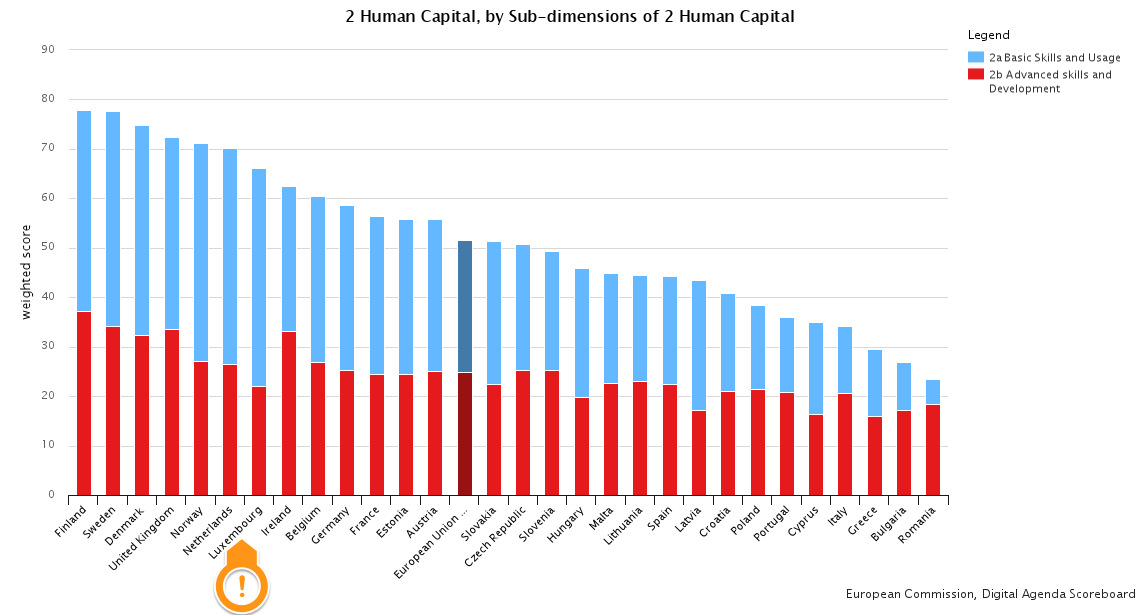
With a Human Capital score of 0.73, Luxembourg takes 4th place in the EU, with a better performance than in the previous year (0.71). The same holds true for all sub-dimensions including the share of internet users in the population and the share of those having basic digital skills which are the highest in the whole EU.
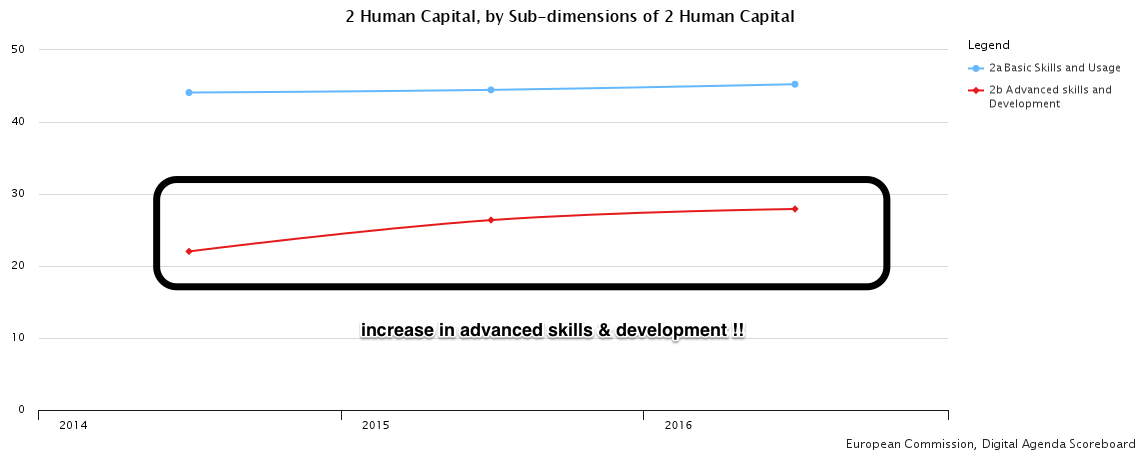
The transmission of technology into new ideas and products hinges on the availability of a vast pool of aptly skilled workers. While the proportion of ICT specialists in total employment, at 5.1%, is relatively high, Luxembourg is lacking skilled ICT professionals.
In 2015, 59.1% of enterprises which recruited or tried to recruit staff for jobs requiring ICT specialist skills reported problems in filling these positions, up from 58.5% in 20146.

Demand for skilled ICT professionals within the economy is rising rapidly, while the supply is not keeping pace.
This problem is also related to Luxembourg’s low number of STEM (Science, Technology, Engineering and Mathematics) graduates. Luxembourg is the worst performer in STEM graduates with a mere 3.6 graduates in STEM per 1000 individuals. More young people need to be attracted to ICT studies and jobs, which provide good career opportunities, are well paid and which are key skills for deriving the benefits of ICT for the economy and society.
In May 2015, the Luxembourg's Minister in charge of Education adopted the "digital4Education' strategy", which enables the Luxemburgish school to contribute to the efforts of 'Digital Lëtzebuerg', involving teachers and young people in projects that educate and train in the advantages
Use of Internet
The use of internet continued to grow in most of the monitored categories with an exception of banking, which has stagnated.
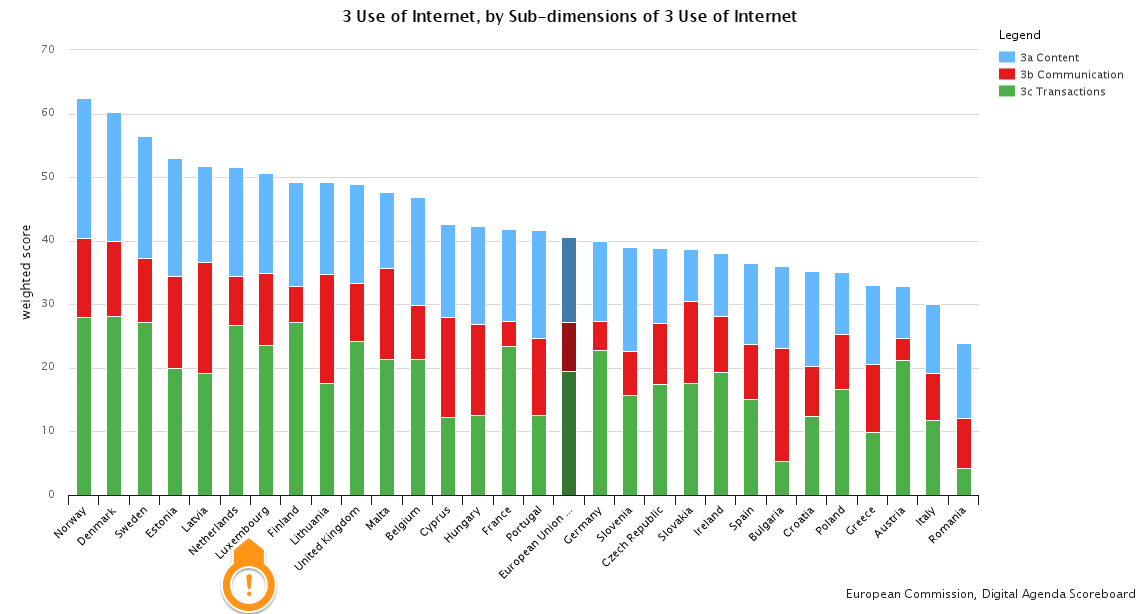
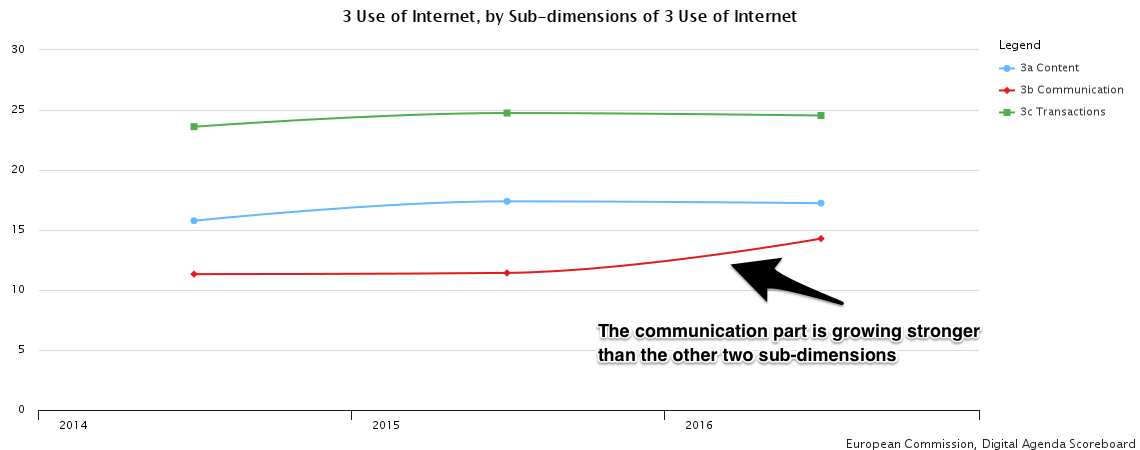
Internet users in Luxembourg are skilled and do not hesitate to engage in a broad range of online activities. They read news online (85%), listen to music, watch films and play games online (59%), use the Internet to communicate via video calls (47%) or through social networks (70%), and obtain video content using their broadband connections (28% of households with a TV use Video on Demand). For most of these activities, engagement among users in Luxembourg is in line with or higher than the EU average.
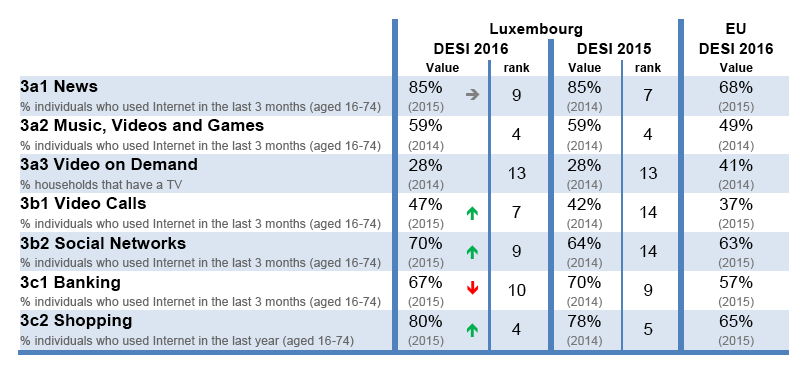
Integration of Digital Technology
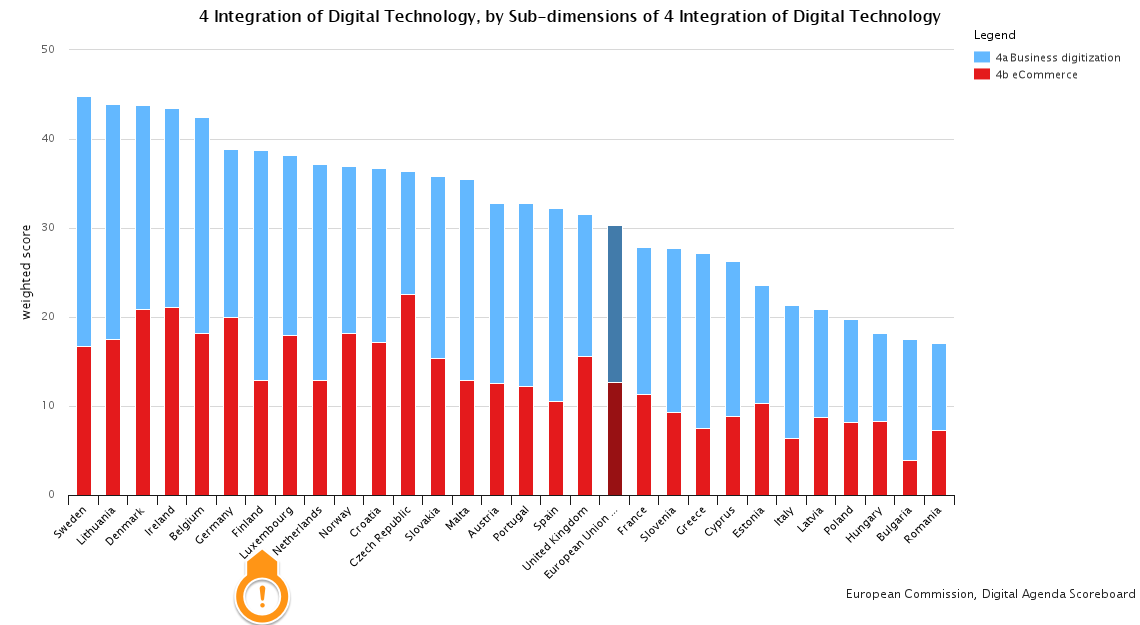
Luxembourg’s businesses exploit well Electronic Information Sharing and RFID technology. However, both the percentage of SMEs selling online and the share of eCommerce in SME’s turnover are low. Moreover, the share of SMEs selling online cross-border dropped dramatically last year. This could be attributed to the change in the calculation of VAT for digital goods from the rate of the country of origin (favourable in Luxembourg) to the rate of the country of destination (as from 1st January 2015).
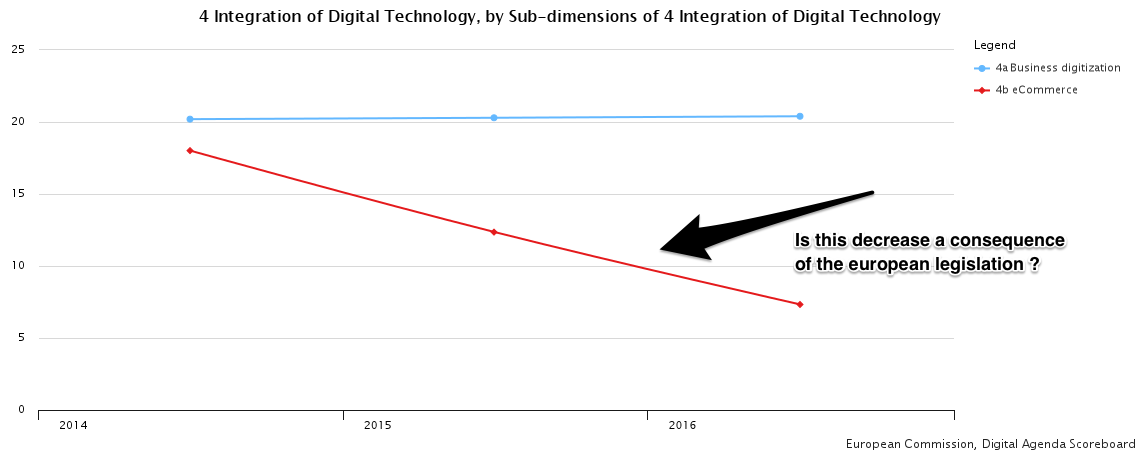
Digital Public Services
In the dimension of Digital Public Services, Luxembourg scores 0.41 and thus ranks only 22rd among EU countries. The country did not show any general betterment in its situation between 2014 and 2015. Therefore, improvements in the area of eGovernement remain to be a key challenge for Luxembourg.
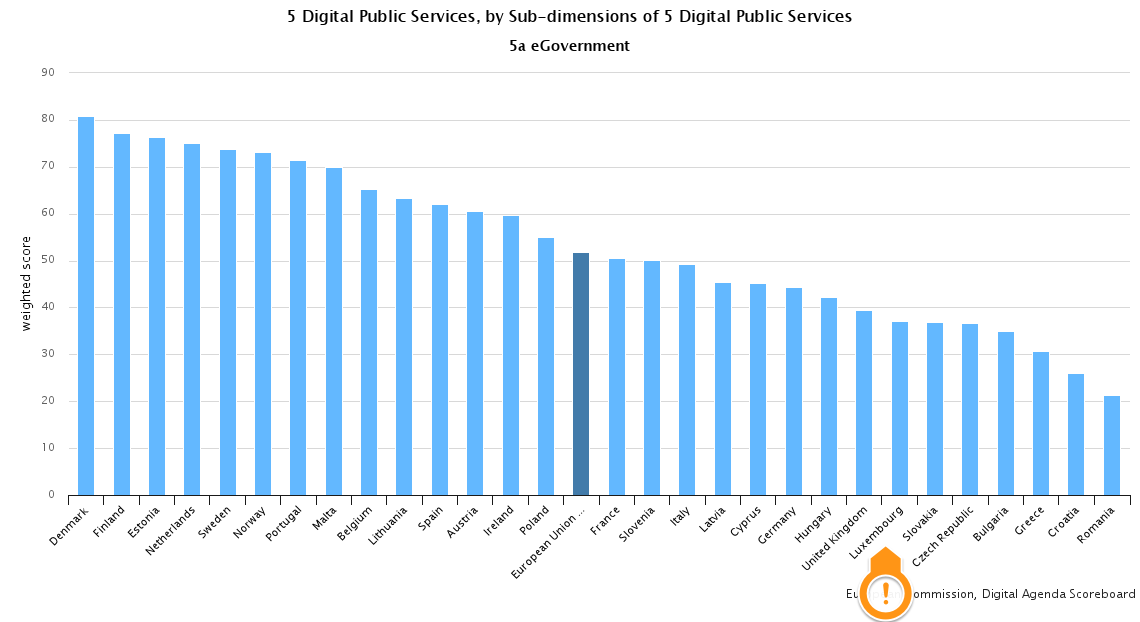
Luxembourg has considerable potential to improve its offer of online public services, as internet users do engage and exchange documents online with the public administration.
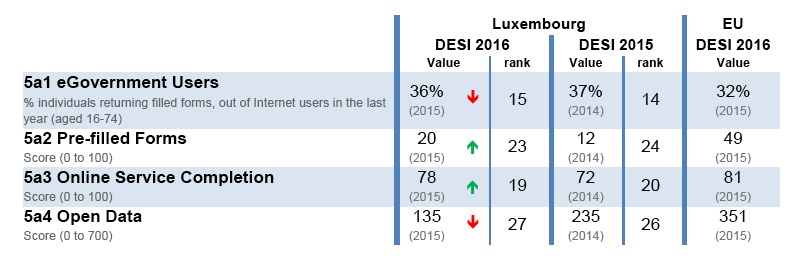
Luxembourg could do more, notably to improve the availability of open data. By making data available, government agencies can enable the private sector to leverage those data and create economic value.


